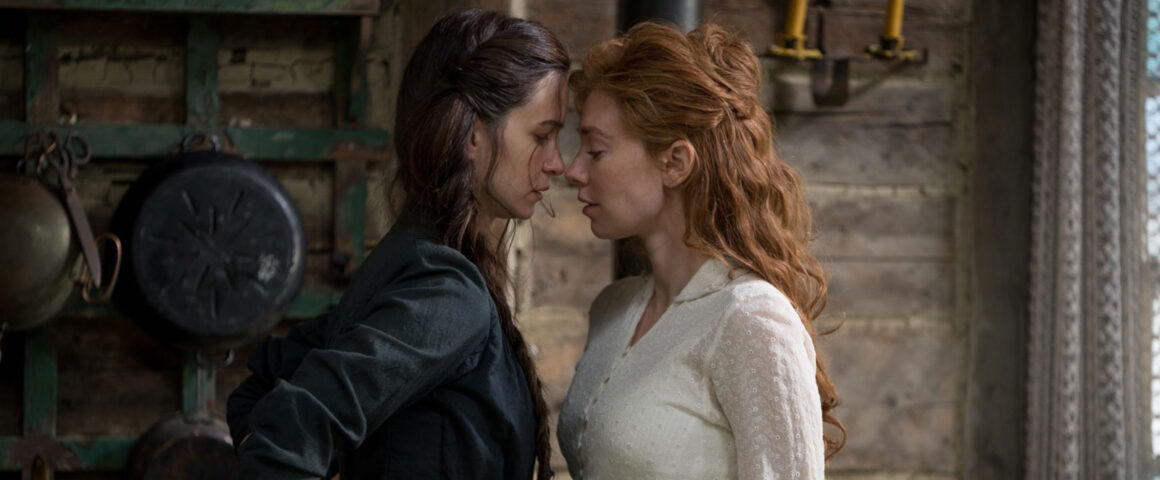Whenever I find myself looking at the treasured imagery of the American Frontier, there’s always a bittersweetness that washes over. Perhaps it is the grandeur of the mountains looming against the most idyllic of cottages, but there’s this sense of melancholy that’s fascinating to explore. One such example comes in the form of Mona Fastvold’s The World to Come, a romantic tale of loneliness and beauty, starring Katherine Waterston, Vanessa Kirby, Casey Affleck, and Christopher Abbott.
Based on co-screenwriter Jim Shepard’s short story of the same name, The World to Come follows Abigail (Waterston, “Fantastic Beasts: The Crimes of Grindelwald”), a quiet farmer’s wife suffering a great loss. Her husband, Dyer (Affleck, “The Old Man & the Gun”) is equally overcome with similar grief, leaving the two’s emotional chemistry colder than the weather outside their door. But when a young couple moves into a neighboring farmland, Abigail finds herself inspired. For the beautiful redhead wife within the pair, Tally (Kirby, “Mr. Jones”) is the connection Abigail has been craving for. But what starts off as a friendly bond becomes something much more significant between the two, causing both women to question their place in their own marriages. And when Tally’s controlling husband Finney (Abbott, “First Man”) begins to notice the women’s admiration for each other, the metaphorical path that Tally and Abigail begin to travel becomes even more bumpy.
Though it is easy to see the similarities between this film and other lesbian-focused romantic tales, The World to Come stands among the competition simply due to the talent it has in front of and behind the camera. In lesser hands, this period drama could have come across as generic as the forgettable ones that have came before it. But with Fastvold’s calculated direction, this is a film that can easily sit on the shelf with the greater examples of this evolving subgenre. From the delicious moments of poignant tranquility to the harsh realities of the world outside the character’s doors, Fastvold takes audiences by the hand into a cinematic landscape that is as lush as it is painful to explore. And Ron Hansen and Shepard’s beautifully written screenplay adds to that effect greatly.
However, there is one element to the duo’s script that could leave most audiences at a fork in the road. Some will argue that Abigail’s narration is frustrating, childish, and perhaps a bit too on the nose. But when it comes to the taste of this writer, there’s something about Waterston’s voice that comes across as the Sundance equivalent to an ASMR (autonomous sensory meridian response) loop. It’s haunting, comforting, and though at times a tad bit simplistic in description, works as a final seasoning on the film’s narrative flow. But who knows — maybe if it had been another actor’s vocals taking us on this journey instead of Waterston’s, I might have a much drastically different take.
But when it comes to the cast’s portrayals of their respective characters on screen, every one of them delivers the kind of performances that perfectly compliments Fastvold’s unique filmmaking sensibilities. To start, Waterston shapes Abigail into a reserved individual that you want to see succeed but deep down know what’s ahead of her. She is a woman ahead of her time, and Waterston is a master at shaping that element within her performance — making Abigail as unforgettable as the stunning landscapes that surround her. The same can be said for Kirby’s take on Tally — for she is the perfect blend of fairytale enchantment and melancholy without even a word of line being spoken. And though Kirby nor Waterston get to explore the physical aspects of their romance like the similarly memorable ladies of “Portrait of a Lady on Fire” do, their chemistry is hard to deny.
On the opposite side of the coin, we have Affleck and Abbott in their respective roles. Thanks to both a unique angle within the story itself and Affleck’s acting chops, Dyer comes across as something more than the forgotten spouse. The actor (who also serves as producer on the film) brings a subtle yet heartbreaking spirit to his character, making Dyer a standout among the ensemble. Unfortunately, that same believability can be said of Abbott’s Finney in all of the wrong ways. From the juxtaposition of his soft voice with his goosebump inducing delivery, to the equally mind-twirling mannerisms in every frame, Abbott is becoming a master of his craft. And though exploring all of the layers of Finney’s arc (along with Abbott’s performance) could tread on spoiler territory, the simplest thing to say is that as cartoony is it may seem, men like Finney did exist.
Yet there is one truly jaw-dropping surprise within The World to Come and that would be Daniel Blumberg’s fascinating score. Though many have heard their fair share of period drama-friendly compositions in the past, Blumberg offers a uniquely jazz infused creation that is the perfect seasoning over Fastvold (and cinematographer Andre Chemetoff’s) cinematic dish. Every cue conjures a new element to the simplest of scenes, coming across as the true star of a movie that has so much to offer in every frame. It might not be the most accessible or classic of melodies on display, but Blumberg’s work breaks new ground within a genre that seemed too old hat.
And that is the ultimate take away from The World to Come — it may at first seem a lot of the same, but by the end, its a new step in the right direction for a genre that’s grown accustomed to tradition. Perhaps it doesn’t have the brutal flair of such films as “Portrait of a Lady on Fire,” but Fastvold’s efforts are something to be cherished, even amongst its similar romantic competition. It takes a simple lugubrious tale and breathes a beautiful aesthetic life into it — an accomplishment that should give Fastvold, along with the entire cast and crew, the respect they so rightful deserve.



